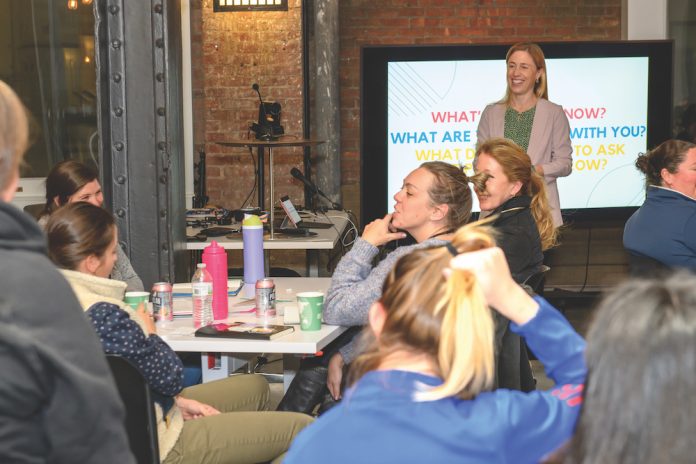Rowing’s first-ever event of its kind, the Women’s Coaching Conference attracted 54 women and nonbinary rowing coaches to the Boston offices of Hydrow for three days of professional development.
To continue reading…
Register for free to get limited access to the best reporting available.
Free accounts can read one story a month without paying.
Or subscribe to get unlimited access to the best reporting available.
To learn about group subscriptions, click here.
Already a subscriber? Login
Participants learned how to advocate for themselves and their crews, handle both administrative and training challenges, and foster networking relationships.
“Response was overwhelmingly positive,” said founder and former Boston University women’s head coach Madeline Davis Tully.
“I’m really happy to be part of the power of this shared experience,” said Ohio State coach Emily Gackowski. “The collective of women here is working toward a better future in our careers and in our lives.”
“I’m really enjoying my time at the first WCC,” said Carrie Cook-Callen, head coach at the University of Kansas. “I’m already really excited to come back, even though we’re not quite done with this one. It really felt like I was engaging and supporting this movement and leaving with far more for myself personally, so it’s definitely a win-win.”
The idea for the conference grew out of the exodus of women from head-coaching jobs in NCAA Division I rowing programs during and following the 2022-23 school year. In total, 11 women from the 90 DI schools that feature a women’s varsity rowing program resigned, retired, or were fired. Five were replaced by men. Less than one third of college head-coaching positions are held by women.
Tully was one of those 11, resigning from her position as director of women’s rowing at BU after six years that included winning the Patriot League championship, leading the Terriers to the NCAA championships, and multiple coach-of-the-year honors. Malcolm Doldron succeeded Tully, who started a family and new professional pursuits.
At the end of the racing season, Tully, who now writes for Rowing News, wanted to do something to encourage women and facilitate coaching careers. Thus was born the Women’s Coaching Conference.
Eight rowing organizations (including this publication) agreed to support the conference financially, with four—Concept2, Head of the Hooch, Shimano, and USRowing—providing scholarships for coaches who otherwise would have missed it. Unique to rowing conferences and conventions, the WCC offered child care.
“We’re happy to support this novel and effective approach to conferences,” said Shimano’s John Geary. “It’s a really nice improvement over the stale old ways of doing it, and helping people get the most out of rowing is what Shimano’s all about.”
“As a DEI expert in rowing, a lot of my day-to-day is ‘give, give, give,’” said Canal Dock Boathouse coach Tamara Clayton. “But when I walk into a room, I don’t want to be known as just ‘the DEI person.’ I’m also skilled and knowledgeable about rowing. I wanted to refill my cup, stay in the loop, and network. Working as a rowing coach and in DEI, you always have to be strong, but here I get to be vulnerable, and that’s a real strength.”
“It’s been great to connect with a lot of brilliant, talented, and accomplished women,” said Stanford’s Lizzy Houston. “I learned a lot of amazing lessons that I’m excited to bring back to my team.”
Conference organizer Tully was pleased.
“Couldn’t have been better for a first time,” she said, adding that a repeat conference in Boston as well as conferences on the West Coast and other parts of the country are planned for next year.
“My dream would be that this becomes obsolete.”

